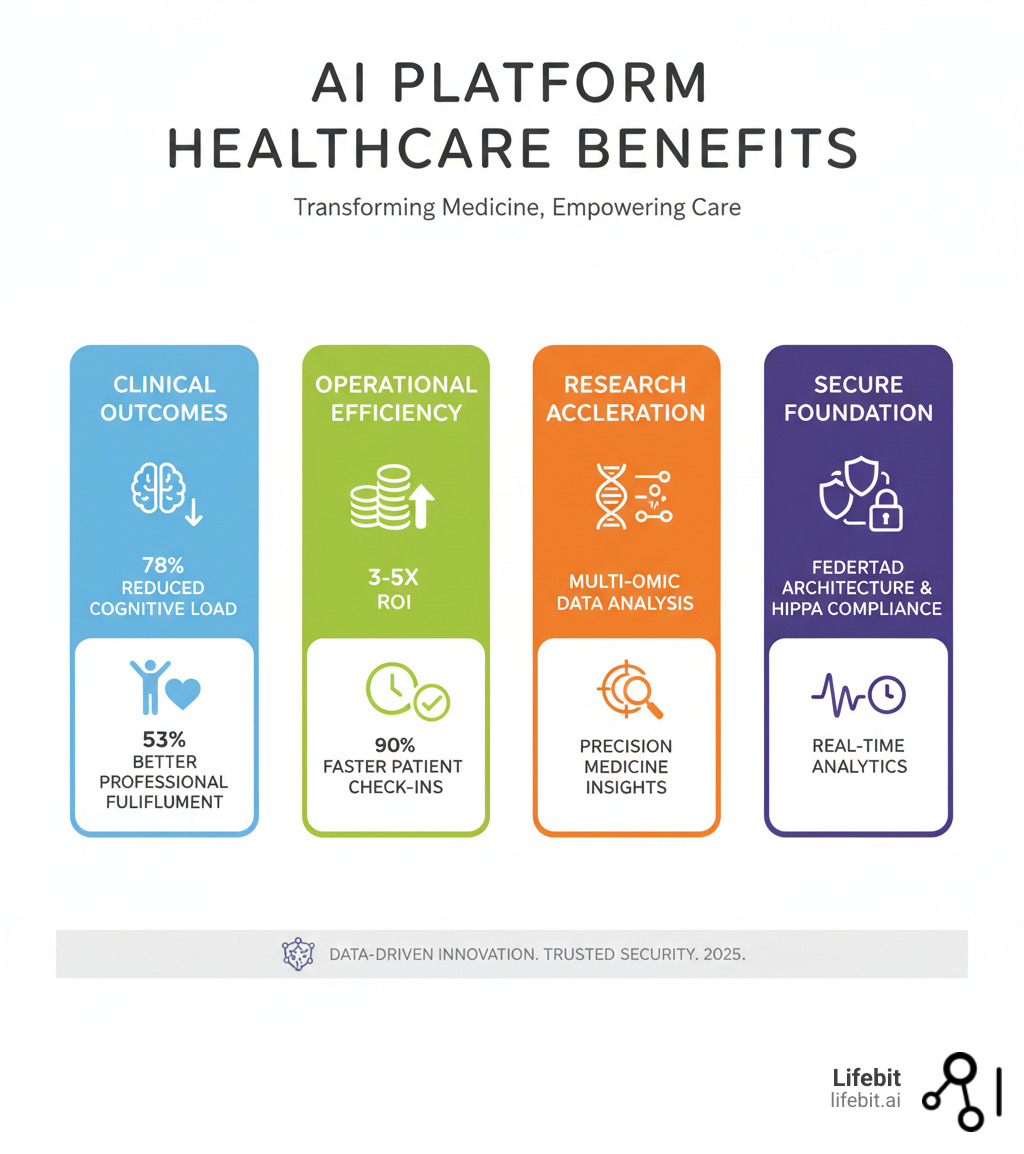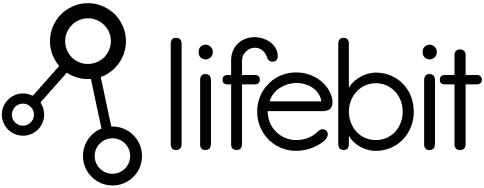AI Platforms in Healthcare: Your Prescription for Innovation

AI platform healthcare: 99% Patient Satisfaction & Innovation.
Stop Burnout, Cut Costs, and Reduce Risk: The AI Platform Healthcare Leaders Use for 3–5x ROI
AI platform healthcare is changing medicine as we know it. Healthcare systems implementing AI solutions report 3-5x return on investment, while 93% of health leaders now see AI as essential to their facility strategy.
Key AI Platform Healthcare Solutions:
- Clinical Documentation: 78% reduction in cognitive load, 86% less after-hours work
- Operational Efficiency: 90%+ reduction in patient check-in times, automated role replacement
- Patient Experience: 99% satisfaction rates, 32% reduction in no-shows
- Research Acceleration: Multi-omic data analysis, precision medicine insights
- Revenue Optimization: Streamlined coding, billing, and prior-auth workflows
The challenge? Most healthcare organizations struggle with fragmented data silos, regulatory compliance bottlenecks, and AI tools that don’t talk to each other. You need real-time access to diverse datasets—EHRs, claims data, genomics—without compromising security or moving sensitive data.
“Evidence shows that healthcare systems with implemented AI solutions can expect a 3-5x return on investment, so it’s not surprising that 93% of health leaders see it as essential to facility strategy.”
The reality is stark: 78% of employees bring their own AI tools to work, creating compliance risks in an industry where the average HIPAA violation costs $9 million. Meanwhile, clinicians face unprecedented burnout from administrative overload.
As Maria Chatzou Dunford, CEO of Lifebit, observes from 15+ years developing federated AI solutions, the future is clear: integrated systems that break down data silos securely, empowering everyone from no-code analysts to advanced researchers.

1. End Clinician Burnout and Cut Admin Work by 78%
Imagine a clinician at 9 PM, still typing patient notes from a day that started at 6 AM. This scene, often called “pajama time,” is an epidemic in modern medicine. Clinician burnout is a full-blown crisis, costing the U.S. healthcare system an estimated $4.6 billion annually in turnover and reduced clinical hours. It’s not just about long hours—it’s about the crushing weight of administrative overload that steals time from patient care. Studies show the average physician spends two hours on administrative work for every one hour of direct patient care.
Here’s where AI platform healthcare becomes a game-changer. Lifebit’s ambient AI works like a brilliant, tireless assistant. During a patient visit, it securely captures the natural conversation, using advanced speech recognition and Natural Language Processing (NLP) to distinguish between speakers and identify medically relevant information. The AI then automatically drafts a structured, accurate clinical note in the appropriate EHR format, ready for the clinician’s review and signature. No more frantically typing while trying to maintain eye contact. No more staying late to catch up on documentation.
Healthcare systems using our platform report a 78% decrease in cognitive load—the mental exhaustion from juggling patient care with endless paperwork. When your brain isn’t constantly switching between caring and documenting, you can think more clearly.
Note summarization happens automatically, turning hours of work into minutes. Clinicians now leave the hospital when their shift ends, which is why we see 86% less after-hours work among users. When you remove the administrative burden, clinicians refind their passion for medicine. That 53% improvement in professional fulfillment we’ve measured isn’t just a feel-good metric; it translates directly to lower staff turnover, improved team morale, and a higher quality of patient interaction.
Without the stress of documentation, you can look patients in the eye, listen without distraction, and be the healer you trained to become. Leading healthcare institutions are already seeing these results, proving that the right AI platform healthcare solution doesn’t just improve efficiency—it restores the joy of practicing medicine.
Ready to dive deeper into how AI transforms complex healthcare processes? Check out our insights on AI for Clinical Trials to see how we’re revolutionizing research workflows too.
2. Triple Your ROI: Boost Hospital Efficiency with Lifebit AI
Hospital administrators know the brutal truth: you’re constantly asked to deliver better outcomes with tighter budgets. Every inefficiency hurts, and operational bottlenecks can mean the difference between thriving and surviving. That’s exactly where AI platform healthcare becomes your financial game-changer.

Healthcare systems using our federated AI platform consistently report 3-5x return on investment. That’s not a marketing promise – that’s real money flowing back into patient care and facility improvements.
For example, AI automation has helped some organizations slash patient check-in times by 90%+. Patients get through faster, staff stress drops, and your front desk can focus on more complex patient needs instead of repetitive data entry.
Behind the scenes, our platform streamlines the entire Revenue Cycle Management (RCM) process. AI-powered tools automate prior authorizations, a notorious source of delays and denials. They assist medical coders by suggesting accurate ICD-10 and CPT codes based on clinical documentation, improving accuracy and reducing compliance risk. This end-to-end automation is how one healthcare system identified 80 automated roles—functions like billing data entry, appointment confirmation, and claims status checking—that could be handled by a digital workforce that never calls in sick.
We’re seeing 78% touchless registrations in facilities that fully accept AI automation. This means fewer errors, faster processing, and staff who can spend their time on meaningful patient interactions. One provider avoided 14,500 no-shows using AI-driven patient engagement, while reallocating over 5,000 staff hours per month to higher-value activities. This means money back in your budget and better patient access for your community.
Our federated platform makes this possible by securely connecting all your data sources – EHRs, billing systems, scheduling platforms – without the security headaches that keep IT directors up at night. The AI learns your workflows and optimizes them in real-time, delivering insights that help you make smarter decisions about resource allocation and patient flow. For example, predictive models can forecast daily patient volumes in the emergency department, allowing for proactive staffing adjustments. It can optimize operating room schedules to maximize utilization and reduce costly downtime. This isn’t just about saving money; it’s about creating a more resilient, responsive, and efficient healthcare system.
To understand how a robust data foundation supports these dramatic efficiency gains, explore our detailed guide on Healthcare Data Management Platform.
3. 99% Patient Satisfaction: How Lifebit AI Improves Experience and Access
Too many patients face a maze of phone trees, paperwork, and delays. AI platform healthcare solutions are making the patient experience as smooth as ordering your morning coffee. When patients are happy, everyone wins. They get better care, stick to their treatment plans, and show up for appointments, leading to improved outcomes and better revenue.
Our federated AI platform is changing how patients interact with healthcare from the very first touchpoint. We’re talking about creating a true “digital front door” that’s intuitive and personal. This single point of entry can include AI-powered symptom checkers that guide patients to the right level of care, self-scheduling tools that show real-time appointment availability, and virtual waiting rooms. By making the initial engagement seamless and user-friendly, healthcare organizations are seeing 99% patient and caregiver satisfaction with their intake processes.
AI is also tackling dreaded no-shows. Through personalized communication and smart automated reminders, one healthcare network saw a 32% reduction in no-shows. That’s thousands of patients getting the care they need and thousands of appointment slots that aren’t going to waste.
Imagine completing all your forms, insurance verification, and pre-visit prep from your couch. Healthcare systems leveraging AI have achieved a 77% pre-visit digital completion rate. This means when patients arrive, they’re ready to focus on their health, not paperwork.
Our platform’s secure data infrastructure makes this seamless experience possible while keeping patient information locked down tight. This is sophisticated, AI-driven patient engagement that understands each person’s preferences and health needs, from their preferred communication channel to their health literacy level. Furthermore, AI can be a powerful tool for advancing health equity. Multilingual chatbots can provide support to non-native speakers, and platforms can be designed to be accessible for individuals with disabilities or low digital literacy. When patients can easily access care and feel heard—regardless of their background—they become active partners in their own health. That’s the kind of experience that builds trust and improves outcomes for all.
For more insights on how AI transforms patient relationships and engagement strategies, explore our deep dive on AI-Driven Patient Engagement.
4. Slash Research Timelines: Open up Precision Medicine with Federated AI
Medical research is drowning in data, with the promise of precision medicine feeling just out of reach as scientists struggle to connect the dots. This is where AI platform healthcare transforms from a nice-to-have into an absolute game-changer.
Imagine researchers in London, Tokyo, and New York collaborating on genomic data without any sensitive information ever leaving its source. That’s the power of our federated AI platform. We’re breaking down the silos that have held back medical research for decades.
Our platform tackles the biggest headache in modern research: multi-omic data analysis. This involves integrating vastly different types of biological data—like genomics (the patient’s genetic blueprint), proteomics (the landscape of proteins at work), and metabolomics (the byproducts of cellular processes). Each ‘omic’ layer provides a unique snapshot of a patient’s health. By using AI to analyze them together, researchers can build a far more complete and dynamic picture of disease, leading to breakthroughs that were previously impossible. Our AI for Genomics capabilities are designed to find the signal in this noise.
The journey from lab bench to bedside has historically taken 15-20 years. AI is dramatically shortening this timeline. Our AI-Powered Biomarker Findy tools help researchers identify promising therapeutic targets faster, while our comprehensive AI in Drug Development suite supports everything from screening to clinical trial optimization.
Our platform enables researchers to develop truly personalized treatment strategies based on individual genetic profiles, lifestyle, and medical history. By harmonizing diverse datasets using standards like the OMOP Common Data Model, we make it possible to analyze millions of patient records while keeping privacy intact. This allows us to leverage vast stores of Real World Data (RWD)—information gathered from EHRs, claims, and patient registries outside of traditional clinical trials. Advanced AI models analyze this RWD to generate Real World Evidence (RWE), revealing how treatments perform in diverse, everyday populations. These patterns, invisible to the human eye, can uncover new uses for existing drugs (drug repurposing) and predict which patients will respond best to a specific therapy.
The future of AI for Precision Medicine is already here. It’s secure, collaborative, and accelerating findings that will save lives.
5. Ditch the Silos: Unify Your Tech Stack with One AI Operating System
Most healthcare organizations are sabotaged by fragmented systems. Disconnected EHRs, imaging tools, and AI platforms create chaos and actively undermine your AI platform healthcare initiatives. The promise of AI can only be realized when these tools integrate seamlessly into your existing infrastructure.
That’s why we built our federated AI platform as a unified operating system, designed for true interoperability with minimal disruption. Our platform integrates directly with your Electronic Health Records system, whether you’re running Epic, Oracle, or another leading provider. We embed AI directly into clinical workflows, making technology feel like a trusted colleague. Leading EHR providers like Epic are developing vast suites of AI features, showing the industry-wide move toward deep integration.
Scalability isn’t optional in healthcare. Our federated AI platform is built to manage multiple AI applications simultaneously across diverse care settings, handling large, complex datasets with the precision and speed that healthcare demands.
For healthcare organizations looking to streamline their data integration challenges, our Clinical Data Integration Platform provides the technical foundation that makes unified AI operations possible.
Core Functionalities of Lifebit’s AI Platform for Healthcare Stakeholders
Our platform’s core functionalities benefit every stakeholder:
- Predictive Analytics: Goes beyond historical reporting to forecast future events. For example, it can identify patients at high risk for hospital readmission, allowing care teams to intervene proactively. It can also predict the onset of sepsis by analyzing real-time streams of vitals and lab results.
- Natural Language Processing (NLP): Unlocks the 80% of clinical data that is unstructured. NLP can scan millions of clinical notes to identify patients eligible for a clinical trial or extract information on social determinants of health, like housing status or food insecurity, that are critical for holistic care.
- Computer Vision: Acts as a second pair of eyes for radiologists and pathologists. It can analyze medical images like X-rays, CT scans, and digital pathology slides to flag potential abnormalities, prioritize urgent cases, and improve diagnostic accuracy and speed.
- Ambient Listening: As discussed, this technology captures clinical conversations to automatically generate notes, reducing documentation burden by up to 78%.
Workflow automation handles administrative tasks like scheduling and revenue cycle management, freeing staff to focus on patient care. Most importantly, our decision support provides clinicians with real-time, evidence-based recommendations and risk scores at the point of care.
The Future of AI Platforms in Healthcare: Generative and Agentic AI
Generative AI creates new content on demand—drafting patient letters, summarizing clinical notes, and assisting with medical coding. We provide the secure infrastructure to integrate these advanced models safely into your workflows.
Agentic AI represents an even bigger leap. These agents proactively manage tasks, anticipate needs, and orchestrate complex workflows. For example, AI agents can handle pre-visit preparation by automatically gathering patient history, labs, and imaging reports. They excel at proactive workflows, identifying patients for preventative screenings, and use conversational AI to provide intelligent virtual assistants for patients, reducing staff workload.
Our federated AI platform provides the secure, scalable foundation needed to power these next-generation AI agents within a trusted research environment.
To explore how agentic AI is reshaping healthcare operations, check out our detailed analysis on Agentic AI in Healthcare.
6. Don’t Get Burned: Your Checklist for a Secure, Scalable AI Platform
Choosing an AI platform healthcare solution is a critical decision affecting patient lives, staff sanity, and your budget. The wrong platform can become an expensive nightmare. That’s why 84% of providers want AI validated by a trusted entity before they’ll consider implementation.
Scalability should be your first non-negotiable demand. Your AI solution needs to grow with you, handling increasing data volumes without breaking a sweat, from routine documentation to complex multi-omic research.
Vendor neutrality is equally crucial. Our federated AI platform takes an open approach, integrating smoothly with your existing systems while giving you the freedom to evolve your tech stack. You maintain control—not the vendor.
For implementation support, you need partners who understand healthcare can’t afford lengthy downtimes. Our platform is designed for rapid deployment, often integrating in weeks, not months, so you see value quickly.
Total cost of ownership (TCO) goes beyond the initial price tag. It includes implementation, training, maintenance, and integration costs. A platform with a lower sticker price might have a higher TCO due to hidden fees or the need for expensive custom development. A robust platform saves you from these headaches.
Finally, validation and trust are paramount. This means demanding transparency from your vendor. How was the algorithm trained? Does the training data reflect your patient population to avoid algorithmic bias? Our platform provides continuous monitoring of algorithm performance and incorporates human-in-the-loop workflows. This ensures that a clinician always has the final say, using AI as a co-pilot, not an autopilot. This builds the trust necessary for widespread adoption.
For healthcare organizations serious about responsible AI implementation, understanding governance frameworks becomes essential. Learn more about building these foundations in our guide to AI-Enabled Data Governance.
Bulletproof Data Security and HIPAA Compliance
Data breaches in healthcare are catastrophically expensive. Under HIPAA, the average violation fine for leaking patient information has reached $9 million. Now consider that 78% of employees bring their own AI tools to work. Every unauthorized query with patient data is a potential lawsuit.
This is why traditional AI platforms, which require moving your data to their servers, are not good enough for healthcare. Our AI platform healthcare solution flips this model. Instead of moving your sensitive patient data, we bring the AI algorithms directly to your data. The analysis happens within your secure environment, and only aggregated, non-identifiable insights ever leave.
It’s like an expert analyzing your data on-site and leaving with only conclusions, not your actual patient files. This federated approach fundamentally reduces breach risk while maintaining full HIPAA compliance. Every query is logged in a detailed audit trail, and role-based access controls ensure that users can only access the specific data necessary for their job. This creates a secure ‘data haven’ where innovation can happen without fear.
Our security architecture includes data encryption, granular access controls, and secure collaboration features. The Trusted Research Environment (TRE) and Trusted Data Lakehouse (TDL) components provide state-of-the-art security designed for healthcare’s stringent requirements. This builds a foundation of trust for fearless innovation.
To understand how this federated approach revolutionizes data analysis, explore our insights on Federated Data Analysis. For a comprehensive look at the secure environments we create, read What is a Trusted Research Environment?.
Frequently Asked Questions about Lifebit’s AI Healthcare Platform
Healthcare leaders naturally have questions when considering an AI platform healthcare solution. You’re selecting a partner that will transform how your organization delivers care, conducts research, and protects patient data. Here are the most common concerns we hear.
How does Lifebit’s AI platform improve patient safety?
Our AI platform healthcare solution acts as a vigilant guardian, continuously monitoring clinical data to identify potential risks. The platform provides real-time clinical decision support, instantly flagging potential adverse events that might be missed during busy shifts. When a patient’s lab values or medication combination poses risks, our AI alerts the care team immediately.
By automating clinical documentation and reducing the cognitive load on clinicians, we also minimize human errors that can creep in during manual data entry. When doctors aren’t drowning in paperwork, they can focus their full attention on their patients.
Our predictive analytics capabilities enable early detection of diseases like sepsis or heart failure by analyzing patterns across vast multi-omic datasets. The federated approach ensures we can learn from global health data while keeping your patient information secure and private.
What is the typical ROI for Lifebit’s AI healthcare platform?
Organizations using our AI platform healthcare solution typically see a return on investment between 3-5x, often within the first year. This ROI comes from multiple sources. Operational efficiency gains through automation mean your staff can handle more patients without burning out. Revenue cycle optimization streamlines coding, billing, and prior-authorization, reducing claim denials and accelerating payment cycles.
Cost avoidance is also significant. By reducing no-shows by 32% and avoiding the need to fill 80 administrative roles through automation, organizations see immediate bottom-line improvements. Factoring in reduced clinician turnover and improved patient throughput, the financial benefits compound quickly.
How long does it take to implement Lifebit’s AI platform?
Unlike traditional AI solutions that require massive data migrations, our AI platform healthcare solution integrates with your existing infrastructure seamlessly. Most organizations achieve full deployment and value realization within weeks, not months. This rapid timeline is possible because our federated approach means your data stays exactly where it is—in your EHR, data warehouse, or secure servers. We bring the AI to your data.
Our implementation team works closely with your staff to ensure minimal disruption to daily operations. Training is streamlined, since our platform integrates directly into the systems your team already uses. It’s a gradual improvement that builds momentum as more capabilities come online.
Conclusion
AI platform healthcare isn’t science fiction; it’s today’s reality for forward-thinking organizations. The change is happening now.
This means clinicians freed from endless documentation, with a 78% reduction in cognitive load. It means hospital operations running like clockwork, with 3-5x ROI and 90% faster patient check-ins. And it means patients are genuinely happy, achieving 99% satisfaction rates.
Most exciting is what lies ahead: research breakthroughs in genomics, precision medicine treatments customized to individuals, and drug findings that take years, not decades. This is the power of secure, federated AI working across global datasets without compromising privacy.
Our federated approach solves the puzzle that has stumped healthcare IT for years: how do you innovate rapidly while keeping data absolutely secure? By bringing AI to your data instead of moving your data to AI, we’ve created a foundation where breakthrough insights and bulletproof security are partners.
Organizations thriving in five years will be those who see AI platform healthcare as the new operating system for medicine, not just another tech upgrade. They’ll be the ones who chose to unify their tech stack, empower their clinicians, and put patients at the center of everything they do.
The future of healthcare is already being written. The question isn’t whether AI will transform your organization—it’s whether you’ll be leading that change or catching up to it.
Ready to see what’s possible when innovation meets security? Find how Lifebit’s federated biomedical data platform can transform your organization.


